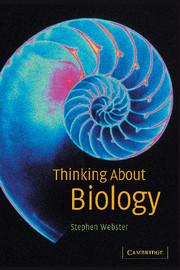4 - Biology and animals
Published online by Cambridge University Press: 24 May 2010
Summary
Ethics in science: an introduction
This chapter is about ethics. I want to show that studying biology not only makes intellectual demands, but ethical ones too. In practice, an ethical issue in biology arises when people disagree on whether it is right or wrong to do a particular piece of research. The operative words here are ‘right’ and ‘wrong’. We are used to seeing biological research as right or wrong in a quite different sense: right in the sense of true, wrong in the sense of untrue. Here we are using the words differently: we are impling that unethical behaviour in science is wrong, in the same way that we consider that lying, or murder, are wrong. Just as in war we tell lies and kill people, and believe that we are doing right, so in the study of ethics in science, there is a lot of space for argument and disagreement, a disagreement never completely resolved by the facts that the two sides marshal as evidence. This chapter looks at the mix of facts, history and beliefs that constitute ethical argument.
Biologists, like all scientists, like to think that they are making the world a better place. The role that genetics plays in modern medicine might be used as an example of how biological knowledge can increase health. Yet biology and its applications are sometimes viewed not with appreciation, but with scepticism.
- Type
- Chapter
- Information
- Thinking about Biology , pp. 109 - 139Publisher: Cambridge University PressPrint publication year: 2003



